
Read our 2023 annual report

Knowledge Hub
We meet four remarkable women, including two Concern staff members, who were affected by the February 6th earthquakes and are now part of the effort to support other women in the aftermath.
Earthquakes do not discriminate. At least not in those terrifying few moments when the ground convulses and structures tumble. In the early hours of February 6th, people of every gender, creed, color, and economic status were equally impacted by the seismic event that rattled a huge swath of southwest Türkiye and northwest Syria.
But as the dust settles, old realities quickly emerge.
Those who were already vulnerable or disadvantaged face greater obstacles as they struggle to survive and recover. The region is home to many who have been displaced and traumatised by a dozen years of conflict, and the ratio of female-headed households here is high. To be a woman in post-earthquake Türkiye and Syria can be especially difficult, but there is also a powerful sense of solidarity in adversity.
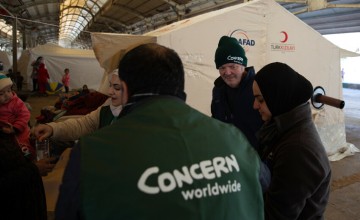
Eflin*
For the past six years, Eflin has been living in Turkey with her 10-year-old nephew. Following the earthquake, she was left with nowhere to go and sought refuge in an informal tent settlement where she has been struggling to survive amidst safety and health concerns.
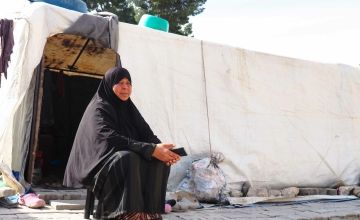
“Accessing our hygiene needs has been difficult, and we were not always able to express our own wishes. When we received aid, our needs for food and heating were prioritised, but it took a long time before anyone asked about our needs as women.
“Despite the challenges, there is a great sense of solidarity among women in the tent area. Since I am a widow, other women living in nearby tents have set up their own tents next to mine and told me that I am not alone. Women whom I had never met before embraced me. The earthquake brought us together.”
Lamyaa
Lamyaa, orginally from Syria, is a team leader for Concern Worldwide Türkiye. She and her family were impacted by the earthquake, for a time sleeping in their car as they waited to hear if their home was safe to return to.
Despite this, she and her colleagues were quickly bringing assistance to other families in need.
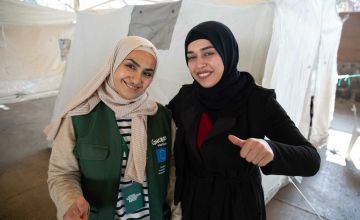
“I saw women and children alone in the street, homeless, in light clothes, in this freezing cold, looking for shelter for her and her children after their house was demolished and they lost their father under the rubble. They were hopeless, terrified, and did not know where to go. It was not similar to the what we lived through during the years of the Syrian war, because of the rockets and missiles falling on us… it was much worse.
“Women are trying to stand firm. We have seen many women volunteering in first aid, psychological support, preparing food, and distributing it to the needy. They are working continuously to help the displaced.
“Women also require psychological support during times of crisis, as they often face significant psychological pressure and may struggle to prioritise their own needs. This is particularly true for mothers, who often put the needs of their family before their own and may not feel comfortable discussing their own challenges and struggles.”
Nayila
Nayila and her family were at their rented home in a rural village in northwest Syria when the earthquake happened, severely damaging the building. A mother of nine, she and the children now share a tent with several other women on a patch of waste ground on the outskirts of a nearby city.
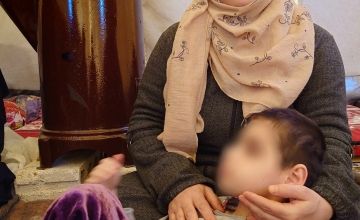
“I was literally throwing my children out of the house as it fell down around us - we were very lucky to get out alive. We had already been driven from our original home by the war and now we find ourselves homeless again. Living in a tent is hard, especially for the girls.
"There are very few toilets. My husband stayed in our village to protect our belongings and to try to earn some money.
“One of my daughters - she’s 12 years old - has severe disabilities. She can’t see or hear properly, and she can’t walk, so I must provide continuous care for her. It is very difficult. I am lucky that the other women here are helping and supporting us, but the stress of this is affecting us all badly. We are just getting by together.”
Alaa
Alaa is a Project Manager for Concern Worldwide in Sanliurfa, Türkiye, leading a team that before the earthquake was providing protection services for refugees, especially vulnerable women and children. She says that the post-earthquake needs are both massive and urgent.
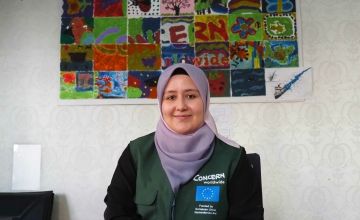
“Women and girls are forced to manage their periods without access to privacy, clean water, and sanitary products, which is incredibly stressful. It is vital to meet their needs to preserve their dignity and protect them from further vulnerabilities.
“Providing hygiene kits, private rooms for breastfeeding, clean and private baths, dignity kits, and maternity kits for pregnant women and new mothers, as well as underwear and clothing for babies, is crucial.
“Additionally, they are more vulnerable and exposed to more risks of exploitation and violence as a result of displacement and homelessness. Also generally disasters might leave girls more exposed to early marriage because of financial instability. We need to meet the basic needs of women and girls to ensure not exposing them to more risks and raise awareness sessions on how to reach services.”

Other ways to help
Corporate support
Is your company interested in working together for a common cause?
Fundraise for Concern
From mountain trekking to marathon running, cake sales to table quizzes, there are lots of ways you can support our work.
Buy a gift
With an extensive range of alternative gifts, we have something to suit everybody.
Leave a gift in your will
Leave the world a better place with a life-changing legacy.
Volunteer with Concern
The lots of ways to get involved with our work as a volunteer
School fundraising
Without the generous support from schools, we wouldn't be able to do the work that we do.

